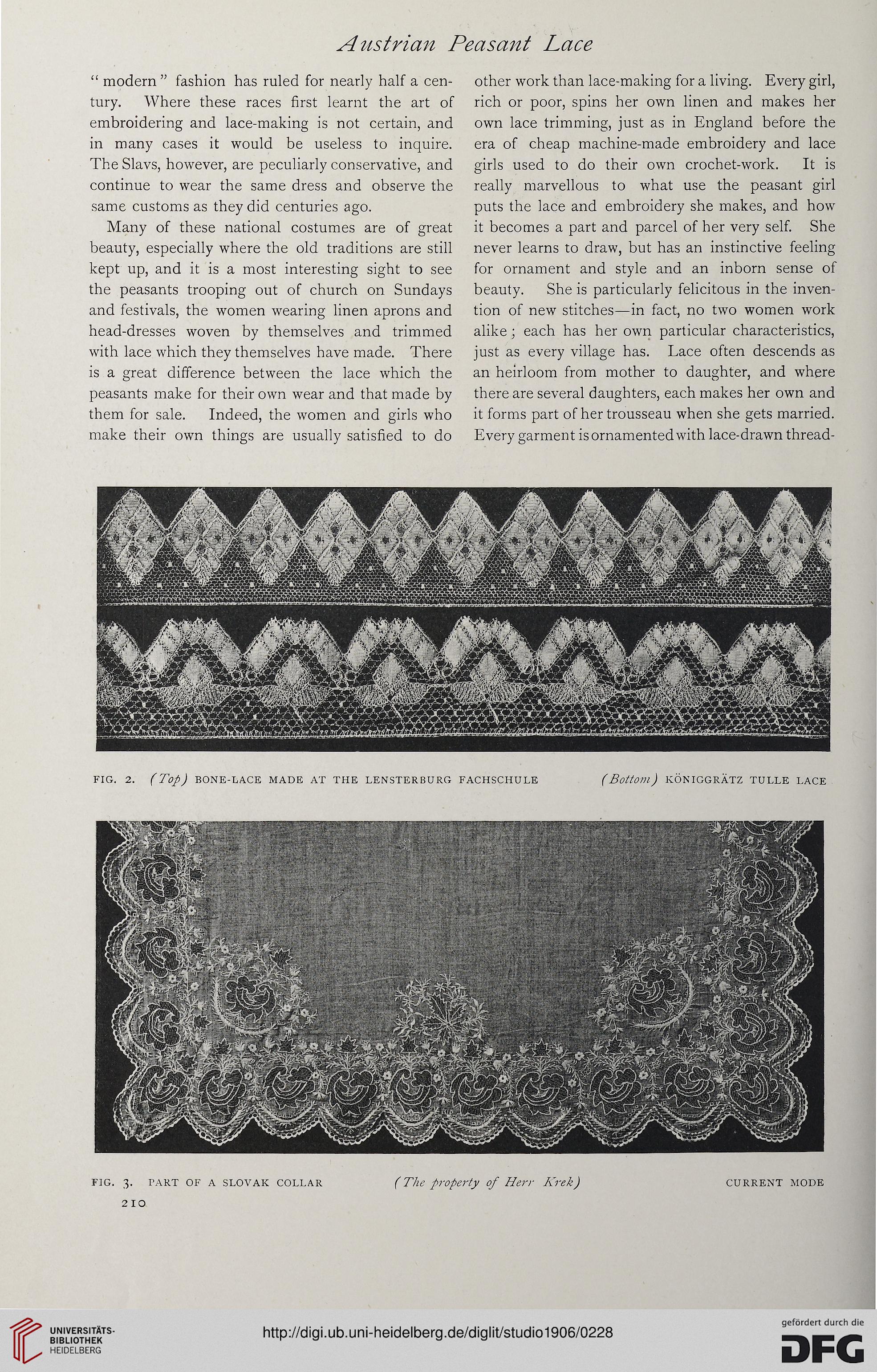Austrian Peasant Lace
“ modern” fashion has ruled for nearly half a cen-
tury. Where these races first learnt the art of
embroidering and lace-making is not certain, and
in many cases it would be useless to inquire.
The Slavs, however, are peculiarly conservative, and
continue to wear the same dress and observe the
same customs as they did centuries ago.
Many of these national costumes are of great
beauty, especially where the old traditions are still
kept up, and it is a most interesting sight to see
the peasants trooping out of church on Sundays
and festivals, the women wearing linen aprons and
head-dresses woven by themselves and trimmed
with lace which they themselves have made. There
is a great difference between the lace which the
peasants make for their own wear and that made by
them for sale. Indeed, the women and girls who
make their own things are usually satisfied to do
other work than lace-making for a living. Every girl,
rich or poor, spins her own linen and makes her
own lace trimming, just as in England before the
era of cheap machine-made embroidery and lace
girls used to do their own crochet-work. It is
really marvellous to what use the peasant girl
puts the lace and embroidery she makes, and how
it becomes a part and parcel of her very self. She
never learns to draw, but has an instinctive feeling
for ornament and style and an inborn sense of
beauty. She is particularly felicitous in the inven-
tion of new stitches—in fact, no two women work
alike; each has her own particular characteristics,
just as every village has. Lace often descends as
an heirloom from mother to daughter, and where
there are several daughters, each makes her own and
it forms part of her trousseau when she gets married.
Every garment is ornamented with lace-drawn thread-
FIG. 2. (Top) BONE-LACE MADE AT THE LENSTERBURG FACHSCHULE (Bottom) KONIGGRATZ TULLE LACE
FIG. 3. PART OF A SLOVAK COLLAR
2 10
( The property of Herr Krek)
CURRENT MODE
“ modern” fashion has ruled for nearly half a cen-
tury. Where these races first learnt the art of
embroidering and lace-making is not certain, and
in many cases it would be useless to inquire.
The Slavs, however, are peculiarly conservative, and
continue to wear the same dress and observe the
same customs as they did centuries ago.
Many of these national costumes are of great
beauty, especially where the old traditions are still
kept up, and it is a most interesting sight to see
the peasants trooping out of church on Sundays
and festivals, the women wearing linen aprons and
head-dresses woven by themselves and trimmed
with lace which they themselves have made. There
is a great difference between the lace which the
peasants make for their own wear and that made by
them for sale. Indeed, the women and girls who
make their own things are usually satisfied to do
other work than lace-making for a living. Every girl,
rich or poor, spins her own linen and makes her
own lace trimming, just as in England before the
era of cheap machine-made embroidery and lace
girls used to do their own crochet-work. It is
really marvellous to what use the peasant girl
puts the lace and embroidery she makes, and how
it becomes a part and parcel of her very self. She
never learns to draw, but has an instinctive feeling
for ornament and style and an inborn sense of
beauty. She is particularly felicitous in the inven-
tion of new stitches—in fact, no two women work
alike; each has her own particular characteristics,
just as every village has. Lace often descends as
an heirloom from mother to daughter, and where
there are several daughters, each makes her own and
it forms part of her trousseau when she gets married.
Every garment is ornamented with lace-drawn thread-
FIG. 2. (Top) BONE-LACE MADE AT THE LENSTERBURG FACHSCHULE (Bottom) KONIGGRATZ TULLE LACE
FIG. 3. PART OF A SLOVAK COLLAR
2 10
( The property of Herr Krek)
CURRENT MODE




